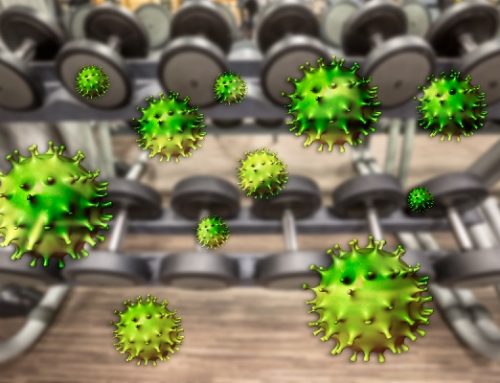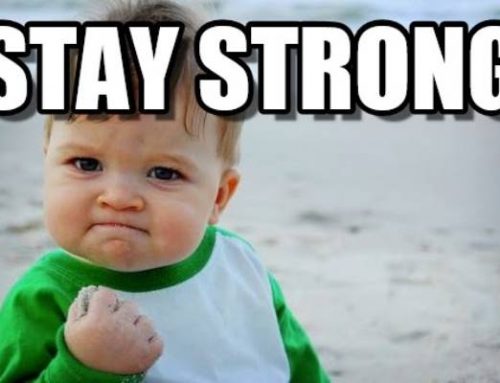Last week, I posted an article about the wide publication of the discovery of an “obesity virus.” Coincidentally, this report came on the tails of en even more publicized study from last month’s New England Journal of Medicine, which reported that Obesity spreads through social networks. Major news media such as the NY Times, the LA Times and CNN, printed dramatic headlines such as, “Research Says Obesity is Contagious!” However, this study was not about obesity being biologically contagious, as in the virus theory, it was about something completely different: It suggested that obesity is “socially contagious.” The sensational news reporting led to many misinterpretations and foregone conclusions by readers, some of whom critized the research and others who dismissed it. However, I believe that this concept – your social network – is something you should take into very serious consideration if you’ve struggled to get in shape or lose weight…
This concept you’re about to hear might even be the one missing piece of the puzzle that can take your results of your fitness program to the next level.
One year ago, I published a special report called, The Fifth Element. The 5th Element revealed a powerful success principle that if put into action, could truly transform not just your body, but your entire life in numerous ways.
The 5th element proposed the following…
1. There are 4 elements that must be present for MAXIMUMresults in your fat loss and fitness program: (1) nutrition,(2) resistance training, (3) cardio training, (4) “mental”training. If you’re missing any element, your results willbe less than they would with all four in place. If you’remissing two or three of these elements, you may get little,if any results at all.
2. When someone has all 4 elements in place and they stillstruggle to get results or stay consistent with those elementsover time, it may be because there is another element they’remissing, which most people never think about or take seriously.
3. This 5th element is social support.
4. Social support can come in many forms including friends,family, church, trainers, coaches, support groups and more.
5. Research in scientific peer-reviewed nutrition, obesity, andmedical journals, as well as sociology and psychologypublications, has provided evidence that programs which includesocial support have better outcomes than those which don’t.
6. When negative social pressure is dragging you down,especially from people close to you, it’s extremely difficultto get maximum results and reach all your goals.
7. If you’re not getting social support for yourfitness endeavors from your family, obviously you can’tchange your family, but you can reach out to enlist supportfrom your friends, and you can seek out new friends and socialcontacts with similar goals as you.
Now fast forward to the present day.
A new study was recently published by researchers from Harvardin the New England Journal Of Medicine, titled:
“The Spread of Obesity in a Large Social Network Over 32 Years.”
The media put their own spin on it with headlines saying,”Obesity is contagious.” However, the study was not aboutobesity being biologically infectious, the study said thatobesity spreads through SOCIAL networks, ie, obesity is”socially contagious.”
12,067 people who had been enrolled in the famous Framinghamheart study were analyzed using a longitudinal statisticalmodel to see whether weight gain in one person was correlatedwith weight gain in his or her friends, siblings, spouse orneighbors.
The results, although not surprising, were extremely significant:
Among adult siblings, if one sibling became obese, the chancethat the other would become obese increased by 40% (55% amongsiblings of the same gender).
If one spouse became obese, the likelihood that the otherspouse would become obese increased by 37%.
Mutual friends – those who both considered each other agood friend – had the highest risk of all. If one becameobese, the risk for the other increased by 171%. Thisshowed that the influence in friendship ties was directional.
There was no effect on risk if an immediate neighbor became obese,but even hundreds of miles did not decrease the risk of weightgain among close social ties (friends, siblings), if theywere obese.
Not only did this paper, which was published in one of theworld’s most prestigious scientific journals, confirm whatI described in “The Fifth Element” about social influence, italso confirmed that geographic distance did not matter,providing even more evidence that social support can beeffective over long distance by internet or phone.
In a previous study, “The role of social support in lifestyle-focused weight management interventions,” researchers from theNetherlands also confirmed that family members, friends, colleaguesand communities (including church) can play an important rolein social support. They referred to this as your “natural network.”
However, we all know how difficult it can be when we aresurrounded by negativity and peer pressure and unfortunately,it often comes from our very own family and friends.
“Cmon!!! A few cookies won’t hurt ya…”
“How do you live like that… eating all that rabbit food?”
“Have a drink… loosen up and have some fun will ya?”
“Life’s too short to live in the gym all the time…”
And so on…
In fact, one study from the University of Michigan (“Social Networksand Social Support In WeightLoss”) found that family members wereconsidered both the MOST helpful and the LEAST helpful by studyparticipants!
Having the support of your spouse or family may be YOUR “5th element”and your greatest leverage – if you can get it – but if you’resurrounded by negativity or your current environment is not conduciveto health and fitness yet, don’t worry, there’s good news:
Although obesity appears to spread socially, the studies also saythat so do health and fitness habits. It’s largely a matter ofgetting around the right people and letting them rub off on you.
The Harvard researchers said:
“It’s possible to harness this same force to slow the spread of obesity.Network phenomena might be exploited to spread positive health behaviors,in part because people’s perception of their own risk may depend on thepeople around them.”
The Dutch researchers agreed and added:
“Bringing new sources of support such as peers into action may behelpful when social support from natural networks is insufficient.”
although my original 5th element was written one year ago, it isstill available, and it’s as important and relevant as ever,especially in light of all the latest evidence backing it up.
If you havent seen the 5th element report yet, I recommend youdownload a copy (it’s free – link below).:
Although this is powerful, you will probably agree, that it’s alsojust confirmation of what most people already know and believe…
You’re only as good as the company you keep.
Tom Venuto, CSCS, NSCA-CPT
www.BurnTheFat.com
www.BurnTheFatInnerCircle.com
PS If you don’t have the natural support network you need, then considerthe suggestion from the Dutch study: Look outside your natural networkand bring new sources of support into action.
Our Burn The Fat Inner Ci
rcle has been the motivational fitnesssupport group of choice for thousands of people from 113 countries in our first year alone.
New research has shown that Internet support groups, whilenot necessarily better than in-person support, are a viableand effective method for providing social support.
To learn more, read visit www.BurnTheFatInnerCircle.com
——————————————
:: FAT BURNING RESOURCES ::
——————————————
BURN THE FAT, FEED THE MUSCLE
How to burn body fat and keep it off for lifewithout supplements, pills or starvation dieting:
http://www.burnthefat.com
BURN THE FAT INNER CIRCLE
The Internet’s premier fat loss support community.Charter rates end soon – don’t miss out…
http://www.burnthefatinnercircle.com







Hi Tom,I have to respectfully disagree with this study in my individual case. I am one 4. I have 2 brothers and 1 sister. All three have always been and still are healthy and low body fat. My brothers are the genetic freaks you speak of that maintain their low body fat % easily. My sister is also on the freaky side in that she can bulk up like a guy. When I say “easily”, I mean to say, they do nothing more than workout 3-5x/wk and eat relatively clean.My parents have never had a weight issue and have always been active. My friends have always been on the athletic side. I married a physical therapist. I, on the other hand, was the fat one. I had no athletic ability other than down hill skiing and I still did not get to the level of my sibs. I was considered fat from 5th grade on(my highest weight at 5’3″ was 210lbs).My stimulus was the same as my sibs and friends, but I still found a way to eat junk and not exercise. No one in my circle of family and friends ate junk. In fact that’s why I became a closet eater. It was shamful to eat the way I did.I will say that I have always had the desire to be fit and athletic and have always felt trapped in my fat body. I believe that is why I never gave up. I believe now that I have matured and read the hundreds of books and articles that you and others have written, everything has sunk into my stubborn brain and I FINALLY have the body I was ment to have. I look like I belong in my family and not like I was adopted.So, because I have always been surrounded by fit people, I have always had the desire to be fit but it took a while for desire and action to come together at the same time.If I understand the hypothesis of the article: you’re more likely to be fat if your friends and family are fat, wouldn’t the opposite be true as well? It was not the case with me. I am but one out of I’m sure 1000’s and there are always exceptions to any rule so I guess I’m just the exception.
I have found this so true with my own family. As a mother of 6 I have the opportunity everyday to influence how the next generation eats and exercises. What is good for me is good for them! They are becoming avid label readers, and sometimes they join me for my workouts. We actually have a chin up bar hanging in the entrance to our kitchen, and no one can resist showing off their strength whenever they pass by it. Even when friends stop by, they will try a pull-up or two. Sometimes I give them what I call “protien frosties” in lieu of ice cream. They really seem to feel good about being informed and making healthy choices. In spite of all the worry about the next generation virtually all being obese, I have great hope that if they are taught correct principles of fitness and nutrition, they will suprise us all by being more fit than we ever dreamed.
KirstenId say your experience validates the study. you wrote:If I understand the hypothesis of the article: you’re more likely to be fat if your friends and family are fat, wouldn’t the opposite be true as well? Yes, thats exactly the point.if you read the full text of the study the researchers said:“The spread of obesity in social networks appears to be a factor in the obesity epidemic. Yet the relevance of social influence also suggests that it may be possible to harness this same force to slow the spread of obesity. Network phenomena might be exploited to spread positive health behaviors, in part because people’s perception of their own risk of illness may depend on the people around them. Smoking and alcohol cessation programs and weight loss interventions that provide peer support — that is that modify the person’s social network — are more successful than those who do not. People are connected, so their health is connected.”So the whole idea is to surround yourself with fit people and let them rub off on you, and be your role models. Should you be in a situation where you are surrounded by people who live unhealthy lifestyles, then you don’t disown your family or give up your friends (although sometimes a negative relationship is left behind), you simply look outside your natural social network to find other avenues of peer support, role models and positive people that you can socialize with who will support your endeavors.
Yes, Tom, I now realize after re-reading what I wrote that I was talking in circles…please forgive my tired brain, lol. I believe what I was attempting to communicate was that while I was surrounded by healthy, athletic people, I was still fat. You say in your 5th element article, if only one or two elements are in place, there is very little chance of success. So I had a major element in place(surrounded by fit people), but it wasn’t until the other elements of a consistant clean diet, resistance training, and cardio that I was able to have permanent results.You know how the media glombs onto studies and my point was that being surrounded my healthy people does not mean automatic fitness will be had.Cheers!
Hi Tom,I totally agree with the article. My best friend from childhood now lives thousands of miles away, but she still remains my mentor, even though she doesn’t know it. We have always been really slim and fit before, but there has been ‘weak’ periods on my part. Whenever that happens though, I remind myself of my best friend who’s as slim and fit as ever – and I feel I shall never allow me to be the ‘loser’. If she can do it, so can I!
HiI think that being in a relationship where the other partner is overweight definately effects a person’s eating habits. My partner was a heavy drinker and then would happily eat crisps etc. Although I did not indulge as much as him it certainly meant that I carried more weight! When I finally did something about loosing the excess weight I could see that my partner felt threatened even though he said he liked the way I looked. He would encourage me to eat unhealthy food so that perhaps he would feel better when he did.
Tom,I disagree. First of all, by only surrounding ourselves with people who are positive…we’d have to leave the world. There will always be opposition when we are attempting to do the right thing in our lives. We should stand against peer pressure & stick to our convictions. Secondly, instead of avoiding “negative” people, let’s interact with them in a positive, encouraging way, to influence them away from their own negativism. Who knows, by our positive feedback, we may help someone else to succeed in their own convictions in their life where they may have been influenced by others negatively. I have found that my greatest critics are sometimes the only ones that are honest, and it forces me to think about what I’m doing and how to better achieve what I want.-Taf
taf – I agree with your disagreement. There are exceptions to every rule, and this works both ways, as indicated in the post above.however, those who are strong enough to stick with their own convictions while completely surrounded by negativity are the exception, not the rule. most people, when surrounded by those with low standards will DROP DOWN to the level of those they associate with.Brian tracy once said that they people you associate yourself with are so influential in your life that “you should get out of negative relationships like you’d get out of a burning house.”Jim rohn once said that your income will be the average of your 5 closest friends.Im not suggesting you abdondon your friends or family, if and when YOU can be the positive influence in THEIR life… but I for one, will not spend time with people who have no ambition, no goals, low standards and a negative attitude. I surround myself with winners and peoplewho are better than me in my fields of expertise.There are exceptions to everything, and this study in the new england journal of medincine showed association not causation, but I bet that if you go by the odds and the averages, most people’s health and body weight will be about the average of their 5 closest friends.
Having formerly been obese…..weighing 250 pounds…..I know first hand how out of control family and friends can be when they see you becoming slim. I heard it all!!! “You lost weight too fast….you’re gonna get sick!!” “You’d look better if you gained 10 lbs.” ETC!!!!Heck….I even got it from friends and family members who were already slim!!! Looking back now, I see that they were either insecure about their own weight issues or jealous that I look better than they did after loosing weight.=) At any rate, I agree with you Tom…..stay around people who support you and all of you efforts in life……and stay away from those who don’t.
I really do not agree with your hypothesis because as a child I was overweight and some of my family members were very negative. I decided to lose weight even though some of my family members put me down all the time. I did it for myself because I figured if I do not take care of myself no one else will. I just blocked everyone’s put downs once and for all!
Hi Tom,I agreed with you by enlisting a support team or mastermind group in anyone’s journey to lifelong health and fitness.Your friends can make you fat or fit. I agreed with other readers that you don’t (and you probably can’t) simply abandon your overweight or obese familyies or friends. But just be careful in who you’re asscoiated with when you want to lose weight and stay in control.http://careyforfitness.blogspot.com/2007/07/power-of-friends.htmlUnfortunately by the time you published this post, Tom, another research report was released. The disturbing news is that the U.S. obesity rate (adults and children alike) continues to rise in 2006.http://careyforfitness.blogspot.com/2007/08/us-obesity-epidemic-continues-to-grow.htmlI’m sure that the public has more awareness in the need for exercise, healthy eating and lifestyle changes. According to the report, 85% adults ackowledged that obesity is an widespread epidemic. We have spent so much money and effort in educating, training and promoting. But the results are failing!Time to call for action!
I must agree that the idea of obesity being a biological virus sounds a little strange. More like a cop-out or excuse, and we don’t need to give people any more of those.I love your discussion of obesity being a social virus. We’ve all been taught since we were kids that we need to hang out with the right people. So now we know it has to do with weight issues as well.Thanks for your great insights!
This is true because amongst our social circles we tend to pick up habits and preferences. We begin to have similar food habits and similar lifestyle habits. So if you are a part of a social group where most of the people are overweight, there is a great probability that you too will become like them.
I totally agree with Tom Venuto. Unfortunately, child obesity is increasing. The reality is it doesn’t apply to just family. If you hang out with friends that are overweight, you are also more likely to be overweight. You are who you associate yourself with.